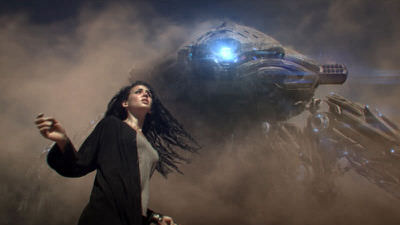A Mixed Bag of Dust Short Films
The Dust sci-fi video brand continues to make, and make available, a wide range of short films, almost at a rate difficult to keep up with. A recent sampling:
David Karlak’s Rise, a so-called “proof of concept” film (basically, a demo reel for a possible feature film or TV series) has been sold to Warner Brothers as a feature film (with Karlak directing). The concepts are nothing new (Wikipedia’s description: “A dystopian future, where man’s attempt to create artificial intelligence has spun wildly out of control, leading to a war between man and machine.”) and it takes liberally from Blade Runner and, as many online have complained, the Wachowski’s “Second Renaissance” sequences from The Animatrix. Made on as little as $38,000, it’s an interrogation scene professionally shot, but, based on what we see here, cliche-ridden. The narration states, “It was a future that no one saw coming.” Actually, it’s a future everyone sees coming — both in real life and in sci-fi movies.
 The Brothers Lynch (David and Keith Lynch) offer Trial, the inconclusive story of a quadriplegic soldier who consents to a mind transfer procedure. Ana Ularu is strong as the soldier’s science facility representative, but the meaning of the twist ending is fuzzy, and not helped by muffled dialogue. This short could have benefited by using subtitles. It’s otherwise well-made, but not really insightful or revelatory in any way.
The Brothers Lynch (David and Keith Lynch) offer Trial, the inconclusive story of a quadriplegic soldier who consents to a mind transfer procedure. Ana Ularu is strong as the soldier’s science facility representative, but the meaning of the twist ending is fuzzy, and not helped by muffled dialogue. This short could have benefited by using subtitles. It’s otherwise well-made, but not really insightful or revelatory in any way.
 The Black Hole, by Phil & Olly, is a three-minute, nearly silent film about a bored office worker discovering a black hole which allows him to greedily reach his hand into places he shouldn’t. Concise and clever, it’s the equivalent of a ’50s EC short story or O. Henry tale.
The Black Hole, by Phil & Olly, is a three-minute, nearly silent film about a bored office worker discovering a black hole which allows him to greedily reach his hand into places he shouldn’t. Concise and clever, it’s the equivalent of a ’50s EC short story or O. Henry tale.
 Douglas Jessup’s Glow concerns weird goings-on in a run-down motel, observed by the motel’s puzzled blue-collar owner, Vern. It’s intriguing, well-directed and acted, and ends right when we’re hoping for an explanation. I’d like to see more of this.
Douglas Jessup’s Glow concerns weird goings-on in a run-down motel, observed by the motel’s puzzled blue-collar owner, Vern. It’s intriguing, well-directed and acted, and ends right when we’re hoping for an explanation. I’d like to see more of this.
Bad Peter, by Zach Strauss, features Frankie Shaw as an expectant mother whose regimen is controlled by her personal digital assistant. The film’s warning of being literally enslaved to technology is not far-fetched in an age of news reports of Alexa creepily laughing for no reason and sending in-house recordings of conversations to other parties. Bad Peter is the first short film produced by Dust.
Lastly, Rajeev Dassani and Elan Dassani’s Seam mightily impresses. Although another “proof of concept” film, and another dealing in the same Blade Runner-esque cliches (war between robots and humans, robots so life-like they don’t know they’re robots, etc.) the twenty-minute long short is visually ambitious and suspenseful, equally adept at personal relationships and full-scale military scenarios. Shot in Hong Kong, Los Angeles and Jordan, Seam looks great and I’m rooting for a feature film for it.
Any random watching of random shorts will naturally skew one way or another in terms of quality. Having seen lots of what Dust has to offer (and with lots more to catch up on), I can say that Dust’s shorts are most successful when they’re self-contained (i.e., not a pitch to investors). Jamie Magnus Stone’s Orbit Ever After is a benchmark for the kind of short I’m referring to and I’m hoping more will be produced and presented.
—Michael R. Neno, 2018 Jun 27
1 Comment
very good
_________________
indianpremierleague2025